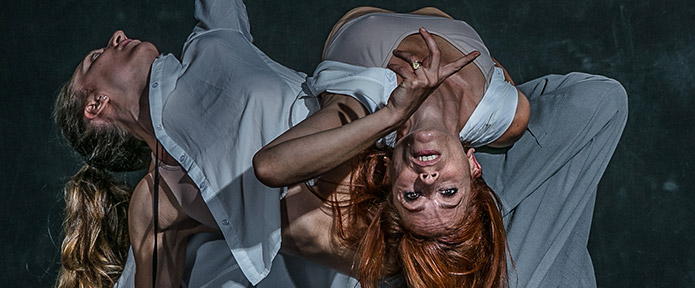Elephant in the Black Box company premieres 'No useless flowers' at the Museum, a journey about exile and the search for identity
Jean Philippe Dury, artistic director of the company, and producer Ana Cabo presented the keys to this show about women in exile after the Spanish Civil War.

A journey about exile and the search for one's own identity. This is how Jean Philippe Dury, artistic director of Elephant in the Black Box Company, defines the proposal of No useless flowersthe show that opens this Friday, at 7:30 p.m., at the Teatro del Museo Universidad de Navarrain the cycle Museo en Danza. Tickets are 16 and 12 euros.
Dury was accompanied during the presentation by Ana Cabo, head of production of the company, and Teresa Lasheras, assistant to José Manuel Garrido, director of Performing Arts of the Museum. At the meeting he explained that this play, which gives voice to women exiled after the Spanish Civil War, addresses a very current scenario: "There are still people who come to Spain in critical conditions, people who want to escape their country. The exile is very present".
In this sense, Cabo pointed out that the piece goes through a geographical exile but also an inner exile: "In addition to the external exile, which can make the Syrian refugees or refugees, or so many other places, there has also been an internal exile of women in conflict situations. In the case of the Civil War and the post-war period, it was that situation: the women who stayed behind also suffered their exile, such as not being able to study or being relegated to a place. The work has a very poetic and suggestive vision". Hence, the play offers the audience a great freedom: "It gives a space to dream of a journey, interior or physical, where everyone goes to look for their place and inner peace".
It was with this same freedom that Marco Blázquez, choreographer of No hay flores inútiles, proposed to the four dancers, Florine Pegat-Toquet (France), Valentina Pedica (Italy), Antonella Sampieri (Argentina) and Bojan Micev (Macedonia), who perform the piece with actress Marta Ruiz de Viñaspre. "Marco has left them a lot of freedom to create. He doesn't impose steps or feelings. First he stands back a bit and lets the person bring out something personal. That is why it is a very special piece. There are four performers with a different energy and he has been able to bring it out of each character and each identity." The fact that the dancers are of different nationalities has enriched the piece, not only because of their different backgrounds, but also because they themselves have left their countries of origin to pursue their passion, dance.
ECHOES OF LORCA
No hay flores inútiles has been a challenge for the company, as Cabo pointed out, since texts and a "more theatrical vision" have been included, with dramaturgy by Paula Soldevila: "We have had a magnificent writer and poet, Nuria Ruiz de Viñaspre, who has written some texts that are heard in the play and an actress, Marta Ruiz de Viñaspre, has been incorporated. It has something of ritual, of prayer". For his part, Dury has valued that "immediately there was a symbiosis that allowed to get something visceral and a magnificent work".
Poetry is very present in this piece, which draws from Lorca's work. "The starting point is Marco Blázquez's first work, 1936, and the dream world and Lorca's female characters, especially La casa de Bernarda Alba. From here, he brings to the present day everything that can happen in these internal and external journeys and exiles," says the company's producer. "It speaks of two memories: that of the word, which comes up to now, and that of the body, through the different ages of the dancers and the movement itself. They are two contrasting memories that complete each other. There is a game and a ritual around what it costs to travel, to decide, to arrive or not".